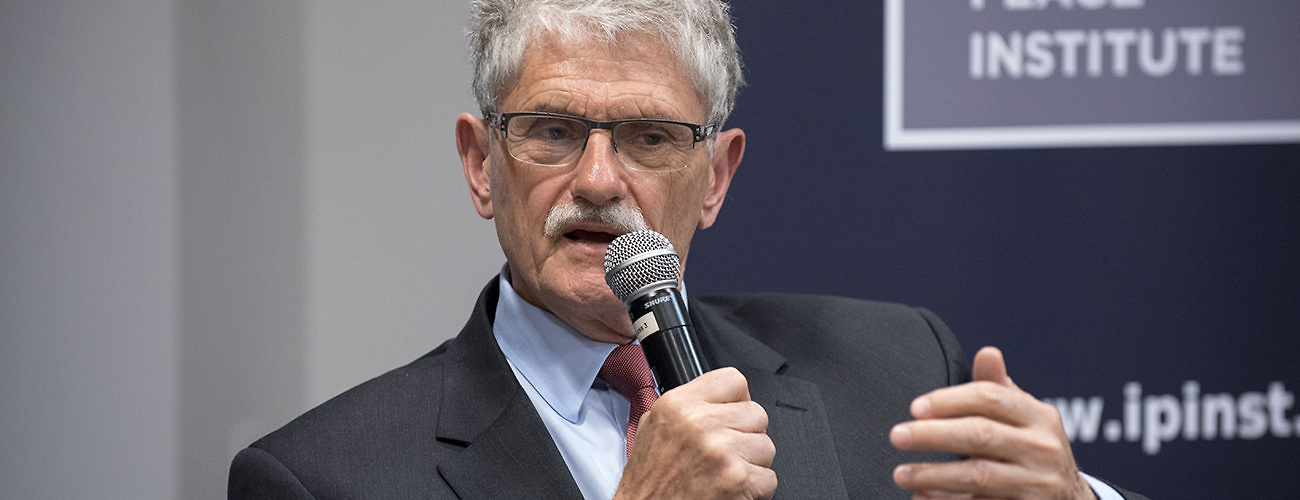Mogens Lykketoft, President of the United Nations General Assembly, told an IPI meeting assessing the results of 2015’s three major UN reviews that the greatest hope of this process was that the UN, “in peace and security, will be much more relevant for the members than it has been in recent years.”
The reviews—on peace operations, peacebuilding, and women, peace, and security—were conducted on separate but related tracks, and this meeting aimed to locate synergies among them to encourage the multilateral system to address peace and security challenges more holistically.
The May 9, 2016 discussion, co-hosted by the Permanent Mission of Denmark to the UN, the Permanent Mission of Italy to the UN, the Norwegian Institute of International Affairs (NUPI), and the Dag Hammarskjöld Foundation (DHF), previewed the President of the General Assembly’s high-level thematic debate on peace and security, which followed the next day. Panelists also reacted to new report from IPI, NUPI, and DHF, titled “Working Together for Peace and Security: Synergies and Connectors for implementing the 2015 UN Reviews.”
Addressing the representatives of member states in attendance, Stephen Jackson, Chief of Policy Planning and Guidance, UN Department of Political Affairs, said that the whole process of conducting reviews was about “all of you keeping us relevant.”
Michèle Griffin, Director of the Policy Planning Unit, Executive Office of the Secretary-General, emphasized that despite the reviews analyzing different policy areas, they reached similar conclusions about the necessary reforms for the organization.
“The reviews are staggeringly convergent in their messaging,” she said. “We don’t want to make the mistake of cherry-picking selective reforms; that loses the underlying messaging of the three reviews.”
Transnational issues like migration, humanitarian assistance, and peacekeeping mean that in the global era, “nobody can be complacent with respect to prevention,” she said.
Pablo Castillo Diaz, Protection Specialist – Peace and Security, UN Women, illustrated why implementing Resolution 1325 on women, peace, and security is so important in the field. He said that “97% of peacekeepers—80% of the leadership, and 70% of the staff—are male. When abuse occurs, the people who are investigating, who interrogate the traumatized survivor, and the people in court if it gets to that, are all likely to be men.”
More than a decade since the landmark resolution was adopted, implementation gaps mean that people are still asking, “Where are the women?” he said. “For traumatized victims of abuse, it matters a great deal.”
In response to an audience question on financing changes at the UN, Stephen Jackson said that all of the reviews talked about under prioritizing financing. He emphasized that this is a continuous process, and that financing will have to be reassessed annually.
A number of factors will have shaped this process in a year’s time. First, he said, the UN is a member-driven organization, and it requires states to “set the momentum” to “help the UN understand what you, the membership, meant through the resolutions.” Looking ahead, he said, the next secretary-general will also play a key role in elevating the issue of financing, and preparing for a high-level debate on the matter at the 2017 General Assembly.
Lykketoft, who has led the most transparent secretary-general election process to date, explained why he believes the next secretary-general must be a strong leader. “I hope if there is this developing understanding among major powers in this world that the totality of existential problems—climate, sustainable development, counter-terrorism, weapons of mass destruction—is there, it could lead also to an understanding that we need a strong personality as the UN secretary-general.”
Andrea Ó Súilleabháin, IPI Senior Policy Analyst, moderated the conversation.








